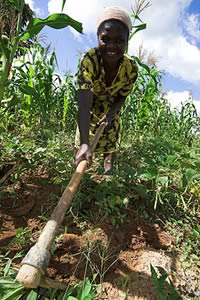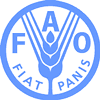 |
|||||||||
|
|||||||||||||||||||
|
|
Urgent Action Required to Address World Food Challenges The upcoming High-Level Conference on World Food Security, to take place next week in Rome (3-5 June), offers a historic chance to re-launch the fight against hunger and poverty and boost agricultural production in developing countries, FAO said today.
In a key policy document specially prepared for the Summit, FAO said that the international community should take urgent and concrete actions to address the issues of hunger and malnutrition in the face of soaring food prices, scarce land and water resources, climate change, increased energy needs and population growth. “The current dramatic world food situation reminds us of the fragility of the balance between global food supplies and the needs of the world’s inhabitants, and of the fact that earlier commitments to accelerate progress towards the eradication of hunger have not been met,” said FAO Director-General Jacques Diouf. “Given the seriousness of global food supply and demand imbalances, cereal markets may not regain their stability any time soon. Prices might come down, but they are not likely to reach their previous low levels for several years to come. We hope that world leaders coming to Rome will agree on the urgent measures that are required to boost agricultural production, especially in the most affected countries, and at the same time protect the poor from being adversely affected by high food prices,” he added. Continued volatility Many agricultural commodity markets continue to be tight despite production increases, FAO said, emphasizing that low stock levels are not likely to be replenished quickly. “The possibility of further sharp price hikes and continued volatility as a result of unforeseen events seems to be likely for the next few seasons,” according to the FAO report “Soaring food prices: facts, perspectives, impacts and actions required.” Many countries are facing the dual challenge of sharp increases in food and fuel prices threatening macroeconomic stability and overall growth. Poor food buyers in the cities and non-food producers in rural areas who spend a large share of their incomes on food are the most adversely affected. The report lists 22 countries that are particularly vulnerable due to a combination of high levels of chronic hunger (more than 30 percent undernourishment) and being net importers of both food and fuel. Countries such as Eritrea, Niger, Comoros, Haiti and Liberia are particularly affected. The report said that increases in domestic prices even by moderate rates (10 or 20 percent) can have immediate negative impacts on poor households that spend a large part of their income on food staples. FAO’s estimate of the number of hungry people in 2002-04 stands at 862 millions, with 830 millions in the developing countries. Twin-track approach With the current situation of high food prices, providing emergency assistance to the most poor and hungry as well as re-launching agriculture and revitalizing rural communities are key elements to reduce hunger and ensure an improved world food situation, FAO said. Protecting the most vulnerable in rural and urban areas would require targeted direct food distribution, food subsidies and cash transfers as well as nutritional programmes including school feeding. Strengthening social protection is especially important for vulnerable groups, including children, pregnant women and the elderly. WFP has called for US$ 775 million to finance these emergency activities. As a short-term response, local food production should be boosted urgently. Measures should include the distribution to small-scale farmers of seeds, fertilizers, animal feed and other inputs through vouchers or smart subsidies. If implemented effectively, such a programme will increase the supply response in poor countries and, thus, improve food availability, increase the income of small producers and may reduce price increases in local markets. FAO has called for US$ 1.7 billion to provide low income food deficit countries with seeds, fertilizers and other inputs to boost production in low-income and food deficit countries. Since 17 December of last year, Mr Diouf announced the provision by FAO of US$ 17 million from its own resources to kick-start this initiative. The report stresses that high food prices represent an excellent opportunity for increased investments in agriculture by both the public and private sectors to stimulate production and productivity. It calls for investment into long neglected areas such as agricultural research, extension and infrastructure. Support should focus on agricultural research serving the needs of poor farmers, many of whom farm in increasingly marginal areas; poor farmers should have better access to factors of production, namely land, water and inputs. The report also notes that unilateral trade policy measures undertaken by countries to ensure domestic food availability can exacerbate price instability on world markets and affect food security in other countries. Policy coordination is important in this respect. Production and trade policies on biofuels may also need to be re-examined in light of their possible effects on international food markets and hence on food security, especially in vulnerable countries. To be successful, decisions made and policies implemented in this area should take into utmost consideration world food security. “This is a unique moment in history: for the first time in 25 years, a fundamental incentive - high food commodity prices - is in place for stimulating the agricultural sector,” Jacques Diouf said. “Governments, supported by their international partners, must now undertake the necessary public investment and provide a favourable environment for private investments, while at the same time ensuring that the most vulnerable are protected from hunger.” The June Summit on food security will offer a unique forum for world leaders to adopt the policies, strategies and programmes that are required to overcome the new challenges to world food security. Many Heads of State and Government have already confirmed their participation in the Summit, which will also be attended by the United Nations Secretary-General and the heads of many United Nations organizations and the Bretton Woods institutions.
|
||||||||||||||||||

|
|
||||||||||||||||||
| home | agri-services | pedigree
pen | news | dairy | beef | machinery property | organisations | site map |
|||||||||||||||||||


